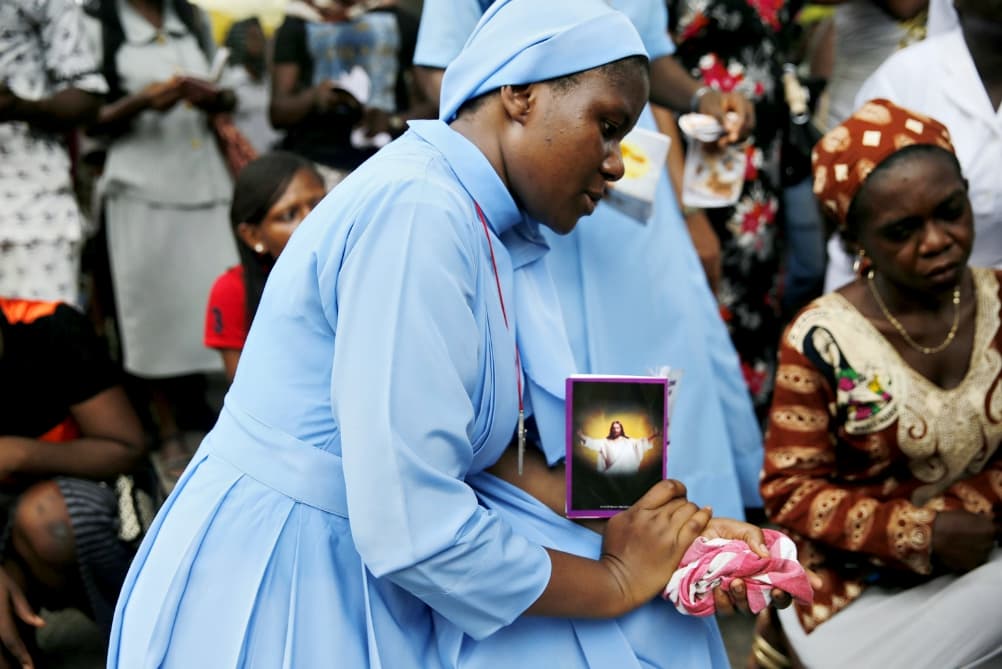ROME – Unknown gunmen abducted four nuns in Nigeria’s Imo state Sunday, making the sisters the latest victims in a swath of kidnappings – many targeting the Catholic community – plaguing the west African nation.
The abduction, which happened while the sisters were on their way to Mass on Sunday, was announced by their order, the Sisters of Jesus the Savior, in a news bulletin Monday.
In the note, the Secretary General of the order, Sister Zita Ihedoro, said “It is with great pain that we bring to your notice the kidnapping of four of our sisters.”
Ihedoro said the kidnapping occurred while the sisters were traveling from Nigeria’s Rivers State to Imo State for a thanksgiving Mass for another member of their congregation.
“We implore intense prayer for their quick and safe release,” she said.
Known as the “Saviourite Sisters,” the congregation was founded in 1985 in the Diocese of Port Harcour, located in Rivers State in southern Nigeria, and their work is primarily dedicated to caring for the sick and suffering, particularly the disabled, the poor, the elderly and the abandoned.
The four nuns who were taken are Sisters Johannes Nwodo, Christabel Echemazu, Liverata Mbamalu, and Benita Agu.
Their abduction took place just nine days after gunmen kidnapped a Catholic priest and a seminarian who were also traveling between the Imo and Rivers states. The men were later released by their captors.
In a tweet publicizing the kidnapping, Alessandro Monteduro, director of the pontifical aid organization Aid to the Church in Need, contextualized the incident as part of “a continuous dripping of violence” in Nigeria and asked national authorities for “a concrete commitment for their release.”
Speaking of the sisters’ abduction, the auxiliary bishop of Minna in Nigeria’s Niger state, Luka Sylvester Gopep, told Fides News, “Unfortunately, the situation in our beloved Nigeria is not improving, but we still look to the future with trust in God.”
In recent years so-called “extortion kidnappings” have become common in Nigeria, and they increasingly target members of the Catholic Church, primarily clergy.
According to the Protestant watchdog group Open Doors International, Nigeria is currently listed as second only to Pakistan in terms of daily violence against Christians.
In 2020, some 3,305 Nigerians were persecuted because of their Christian faith. In the first six months of 2022, more than 20 Catholic priests have been kidnapped, and in some cases, killed.
While some of these kidnappings are religiously motivated, most are revenue streams for criminal groups who target the Catholic Church because it is seen as a large institution with deep pockets, and therefore would be willing to pay ransoms for the release of its people.
Nigeria’s population of just under 216 million is roughly equally divided between Christians and Muslims, so Christians are not a minority in the country. However, they have also been targeted by jihadist groups who will kill their captives, rather than seek ransom payments, because they are opposed to the Christian presence in Nigeria.
In Nigeria’s Middle Belt, Christians have increasingly become victims of violence unleashed by the Fulani herdsman, who are majority Muslim. They attack Christian villages and run them out of town in an attempt to grab their land for grazing.
According to the African Center for Strategic Studies, there have been more than 15,000 deaths since 2010 as a result of violence between farmers and herders over land use, with most of the violence concentrated in West and Central Africa.
Nigeria has been a particular hotspot, with roughly half of their casualties coming after 2018.
While the ultimate motives of the Fulani’s carnage are economic, the violence is often exacerbated by ethnic, cultural, and religious elements, opening the door to extremist groups to both instrumentalize and inflame the conflict to grow their own enterprise.
Nigeria’s government has pledged in recent months to expend significant resources to protecting Christians.
Presidential elections in Nigeria are set for early next year, and given the increase in kidnappings throughout Nigeria, security will likely be a major electoral issue in the run-up, with past government failures weighing heavily on voters’ minds.
Follow Elise Ann Allen on Twitter: @eliseannallen















